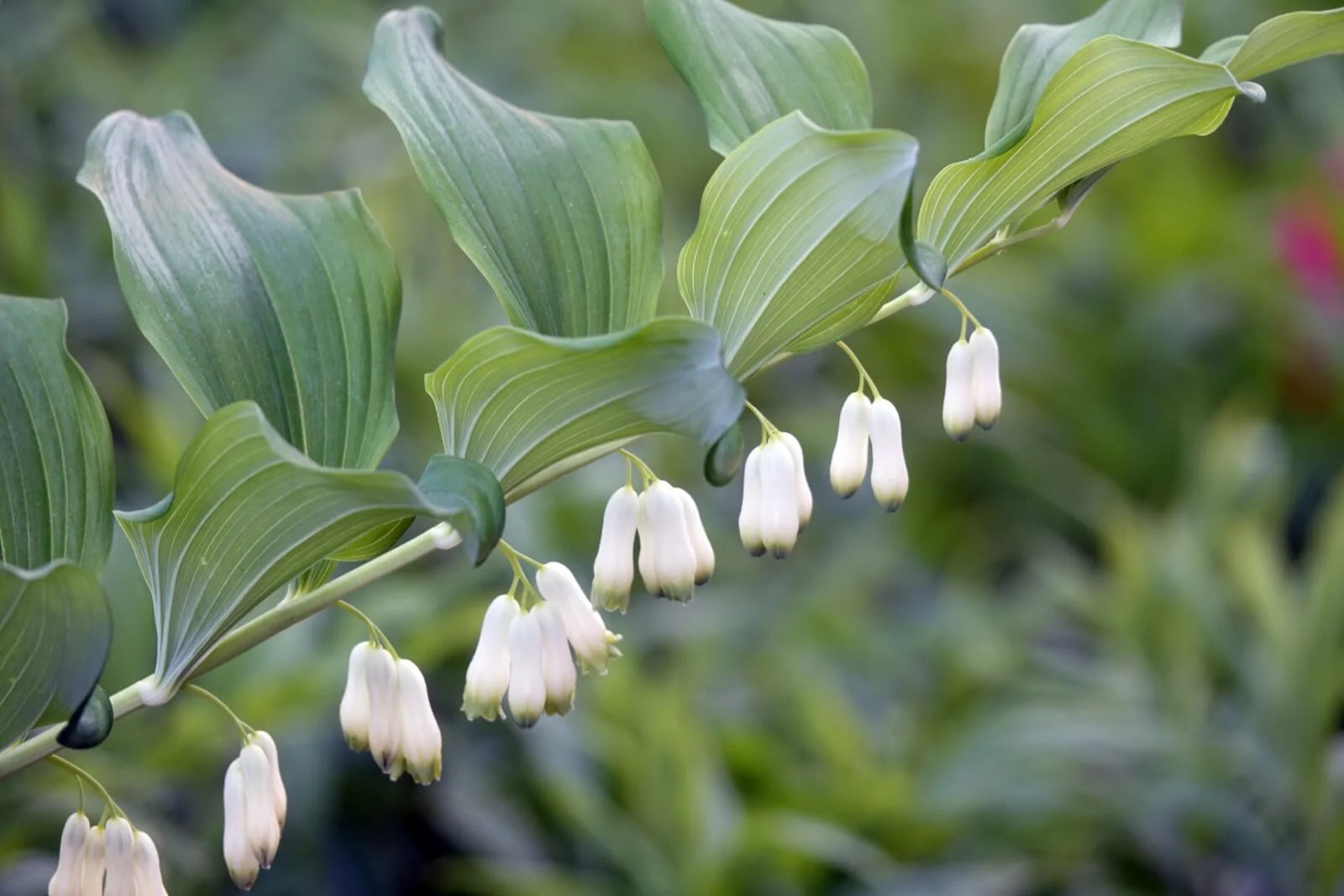
Solomon’s Seal is a fascinating plant that holds a rich history and an air of mystery. With its delicate white flowers and distinctive seal-like markings on its roots, Solomon’s Seal has captured the imagination of botanists, herbalists, and enthusiasts for centuries. This perennial plant, scientifically known as Polygonatum, is native to temperate regions around the world and is revered for its medicinal properties and ornamental value. In this article, we will explore 14 enigmatic facts about Solomon’s Seal, delving into its symbolism, traditional uses, cultural importance, and more. So, sit back, relax, and embark on a journey to uncover the intriguing secrets of this remarkable plant.
Key Takeaways:
- Solomon’s Seal: A Magical Plant with Mystical History
Discover the enchanting world of Solomon’s Seal, a plant steeped in legends and folklore, known for its protective properties and rich symbolism. From ancient wisdom to modern herbalism, its allure is timeless. - Cultivate Solomon’s Seal for Beauty and Healing
Embrace the beauty and healing power of Solomon’s Seal in your garden. With its elegant foliage and medicinal properties, this mystical plant offers a connection to nature and a touch of enchantment to your outdoor space.
The Legends Surrounding Solomon’s Seal
One of the most intriguing aspects of Solomon’s Seal is its inclusion in various legends and folklore. According to one legend, the seal was named after King Solomon, who was said to possess great wisdom and secret mystical knowledge. It was believed that the signet ring he used contained the symbol of Solomon’s Seal, which granted him power and control over supernatural forces.
An Ancient Symbol of Protection
Throughout history, Solomon’s Seal has been regarded as a powerful symbol of protection and divine influence. It is believed to possess significant magical properties that ward off evil spirits and provide spiritual guidance. Many ancient civilizations, including Egypt and Mesopotamia, incorporated the symbol of Solomon’s Seal into their religious practices.
A Plant Rooted in Botanical History
Solomon’s Seal, scientifically known as Polygonatum, is part of the Asparagaceae family and is native to Asia, Europe, and North America. It is a perennial herbaceous plant that grows in shady woodland areas, known for its distinctive arching stems and bell-shaped white or greenish flowers.
The Unique Shape of Solomon’s Seal Leaves
One of the remarkable characteristics of Solomon’s Seal is its distinct leaf shape. The leaves are elongated and oblong, tapering towards both ends. They are veined and have a smooth, glossy texture. The shape of the leaves is said to resemble the signet ring of King Solomon, hence its name.
The Symbolic Meaning of Solomon’s Seal
Solomon’s Seal has been associated with numerous symbolic meanings throughout history. It is often seen as a symbol of balance and harmony, representing the perfect union of the physical and spiritual realms. The interlocking shape of the plant’s stems has also been interpreted as a symbol of interconnectedness and continuity.
Medicinal and Therapeutic Uses of Solomon’s Seal
Solomon’s Seal has been used for centuries for its medicinal properties. The plant’s rhizomes and roots contain beneficial compounds that have anti-inflammatory and antioxidant effects. In traditional herbal medicine, it is often utilized to treat ailments such as joint pain, digestive issues, and respiratory conditions.
The Intricate Flower Structure
Solomon’s Seal produces delicate, pendulous flowers that hang gracefully from the arching stems. The flowers typically have six petals and are arranged in pairs along the stem. They emit a subtle fragrance, attracting pollinators such as bees and butterflies.
Solomon’s Seal, a Popular Ornamental Plant
Due to its elegant aesthetic and versatile nature, Solomon’s Seal is a sought-after plant for landscapers and garden enthusiasts. It thrives in shaded areas and can add a touch of sophistication and natural beauty to any garden or woodland setting.
The Mystical Symbolism in Alchemy
In alchemical traditions, Solomon’s Seal holds profound mystical symbolism. It is often associated with the concept of transformation and the union of opposites. The plant’s distinctive shape, interlocking stems, and balanced proportions are believed to represent the harmony of the elements and the quest for spiritual enlightenment.
Botanical Classification and Varieties
There are several species and varieties of Solomon’s Seal, each with its unique characteristics. Some notable variations include Polygonatum biflorum, Polygonatum odoratum, and Polygonatum falcatum. These variations differ in their growth habits, flower color, and geographic distribution.
Solomon’s Seal, a Host Plant for Moths
Solomon’s Seal provides a valuable food source and habitat for various moth species. Numerous moth caterpillars feed on the leaves and stems of the plant. One such example is the Promethea moth, which relies on Solomon’s Seal as a crucial host plant during its life cycle.
Symbolic Connection to King Solomon’s Wisdom
The association of Solomon’s Seal with King Solomon’s wisdom has lent it a revered status in mystical traditions. It is believed that the seal encapsulates the secrets of the universe and possesses the power to harness deep wisdom and spiritual insight.
Propagation and Cultivation of Solomon’s Seal
Solomon’s Seal can be propagated through division or from seeds. It thrives in moist, well-drained soil and prefers partial to full shade. Gardeners and plant enthusiasts can cultivate Solomon’s Seal in their own gardens to experience its enchanting beauty and symbolic significance.
The Legacy of Solomon’s Seal in Herbalism
Throughout history, Solomon’s Seal has been highly regarded in traditional herbalism. It has been used in poultices, decoctions, and tinctures to alleviate various ailments and promote overall well-being. The plant’s healing properties continue to be celebrated and utilized in natural medicine practices today.
Conclusion
In conclusion, Solomon’s Seal is a fascinating plant with a rich history and numerous beneficial properties. From its traditional medicinal uses to its symbolism in various cultures, this plant continues to captivate people around the world. Whether you are a herbal enthusiast, a plant lover, or simply curious about the wonders of nature, exploring the enigmatic facts about Solomon’s Seal is sure to leave you amazed and intrigued. So next time you come across this beautiful perennial, take a moment to appreciate its unique characteristics and the secrets it holds. Solomon’s Seal is truly a remarkable and mysterious plant that offers both beauty and intrigue.
FAQs
Q: What is the significance behind the name “Solomon’s Seal”?
A: The name “Solomon’s Seal” is believed to have originated from the markings found on the rootstock of the plant, which resemble a seal or signature. It is said to be associated with King Solomon in various traditions and legends.
Q: Can Solomon’s Seal be consumed as a herbal remedy?
A: Yes, various parts of the Solomon’s Seal plant, including the roots, leaves, and rhizomes, have been used in traditional herbal medicine for centuries. However, it is important to consult with a qualified herbalist or healthcare professional before using it for medicinal purposes.
Q: Does Solomon’s Seal have any specific growing requirements?
A: Solomon’s Seal is a hardy plant that generally prefers shaded or partially shaded areas with moist, well-drained soil. It can thrive in different types of soil, including sandy and loamy soils, and is suitable for both garden beds and containers.
Q: Can Solomon’s Seal be propagated easily?
A: Yes, Solomon’s Seal can be propagated through rhizome division, which involves separating the rhizomes into sections and planting them in new locations. This process is relatively simple and can help expand your Solomon’s Seal population in your garden.
Q: Are there any known side effects or precautions when using Solomon’s Seal?
A: While Solomon’s Seal is generally considered safe for most people when used in recommended amounts, some individuals may experience allergic reactions. Additionally, pregnant or breastfeeding women should consult with a healthcare professional before using Solomon’s Seal medicinally.
Q: Can I grow Solomon’s Seal indoors?
A: Yes, Solomon’s Seal can be grown indoors as long as it is provided with the appropriate growing conditions. Select a location with bright, indirect light and maintain consistent humidity levels. Regular watering and well-draining soil are also important for indoor growth.
Unraveling Solomon's Seal's enigmatic history is just the beginning of your botanical journey. Dive into herbal medicine secrets, marvel at perennial plants like Yellow Loosestrife, or explore Thyme's medicinal properties. Nature's wisdom awaits your discovery, offering a treasure trove of knowledge and wonder. Embark on this fascinating exploration, and let the mysteries of the plant world captivate your imagination. From ancient legends to modern-day applications, there's always more to uncover in the realm of botany. So, which fascinating topic will you delve into next?
Was this page helpful?
Our commitment to delivering trustworthy and engaging content is at the heart of what we do. Each fact on our site is contributed by real users like you, bringing a wealth of diverse insights and information. To ensure the highest standards of accuracy and reliability, our dedicated editors meticulously review each submission. This process guarantees that the facts we share are not only fascinating but also credible. Trust in our commitment to quality and authenticity as you explore and learn with us.


